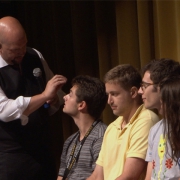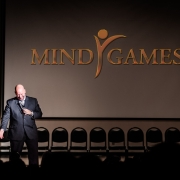Why So Many People Think Stage Hypnosis is Fake (and what most often convinces them it’s real).
Stage hypnosis has been my career since 2004, and in that span of time I've hypnotized approximately 25,000 people. High school students, college students, and adults at corporate events and theater shows have shared the experience with me. My audiences have been as small as 25 people, and as large as 1600. Throughout it all, there have always been, and always will be, naysayers and skeptics. And that's okay.
First of all, I think a healthy skepticism is an important quality of being a free-thinker. I don't ever take it personally when people tell me they're skeptical about stage hypnosis. I do get a bit perturbed when people make absolute statements like, "There's no way it's real" or "You'd have to be an idiot to believe in hypnosis." Those statements, and variations of them, have been shared with me many times. Why are some people so harsh in their criticism of hypnotism?
Sometimes it's because the hypnotist is actually a fraud, but that's rare these days. More often, it's due to a fundamental misunderstanding of what is going on for the person who is hypnotized, and as long as you haven't had the experience yourself, you can't fully appreciate what is happening on stage. When you're an audience member at a stage hypnosis show, you sit in your seat and evaluate everything you see happening on stage through the critical thinking filter of your conscious mind. It is only natural, then, for those critical thinking skills to raise red flags for you.
"Normal" people don't act like this.
"Regular" people would never do that.
This can't be real.
For an audience member, using their typical critical thinking skills that they use every day of their lives, what appears at a stage hypnosis show looks to be simple spoofing, play acting. It seems especially foolish when you only get to see a picture or a quick video clip from a show. These things only capture a moment, without giving any window into the greater experience that volunteers at stage shows are having.
When a person volunteers to be in a stage hypnosis show, and successfully enters a hypnotic state, that person no longer thinks critically like all the other people in the audience. The volunteer is now using their brain in a different way. The frequency of the brain waves actually changes, slowing down. They are more like a person who is having a powerful daydream than the astute and skeptical observers in the audience.
In this different set of brain activity, the hypnotized volunteer is typically experiencing some level of dissociation. They can even have powerful hallucinations. When the hypnotist gives a suggestion on stage, the way it is processed by the hypnotized volunteer is quite different from the way someone in the audience thinks about it. Let me give you a specific example.
A long-standing bit in the world of stage hypnotism is to give a man the suggestion that he is having a baby. As that suggestion is being given to a volunteer on stage, it would only be natural for a person in the audience to think of it as ridiculous. Thinking critically, we know that men can't have babies. They simply aren't built for it, biologically speaking. But the volunteer on stage takes suggestions literally. The volunteer does not think critically. So when told that he will have a baby, the volunteer who accepts the suggestion fulfills it by having some level of a hallucination.
I have had men on stage weep with joy at the arrival of their newly birthed child. I've watched them cradle the hallucinated baby in their arms. For them, it isn't much different than having a dream. Haven't you had a dream before that was so realistic at the time of the experience that you were completely exhilarated or terrified by the dream experience's realness? That's how it is for highly hypnotizable people. But for the person in the audience, still thinking critically about what they are watching, it just seems too implausible, sometimes.
The most common experience that "converts" skeptics into believers is a wonderfully simple experience: watching someone you know get hypnotized. More times than I can count, I've had someone come up to me after one of my shows and say, "I never believed in hypnosis before tonight, but tonight my ______ was up on stage, and I know they would never do that on their own. For them to be up there, like that, it has to be real."
One of the things I enjoy most about my work is that I can entertain people while also opening their minds to new and different experiences, and to new and different ways of thinking about themselves. In that way, I think stage hypnotism is a gift.





